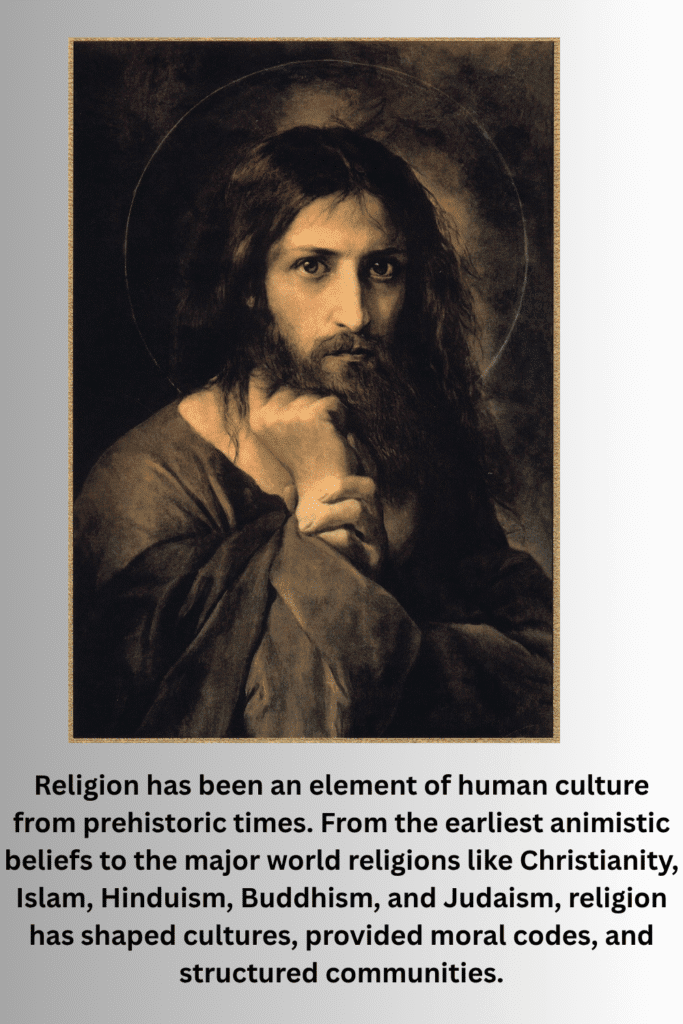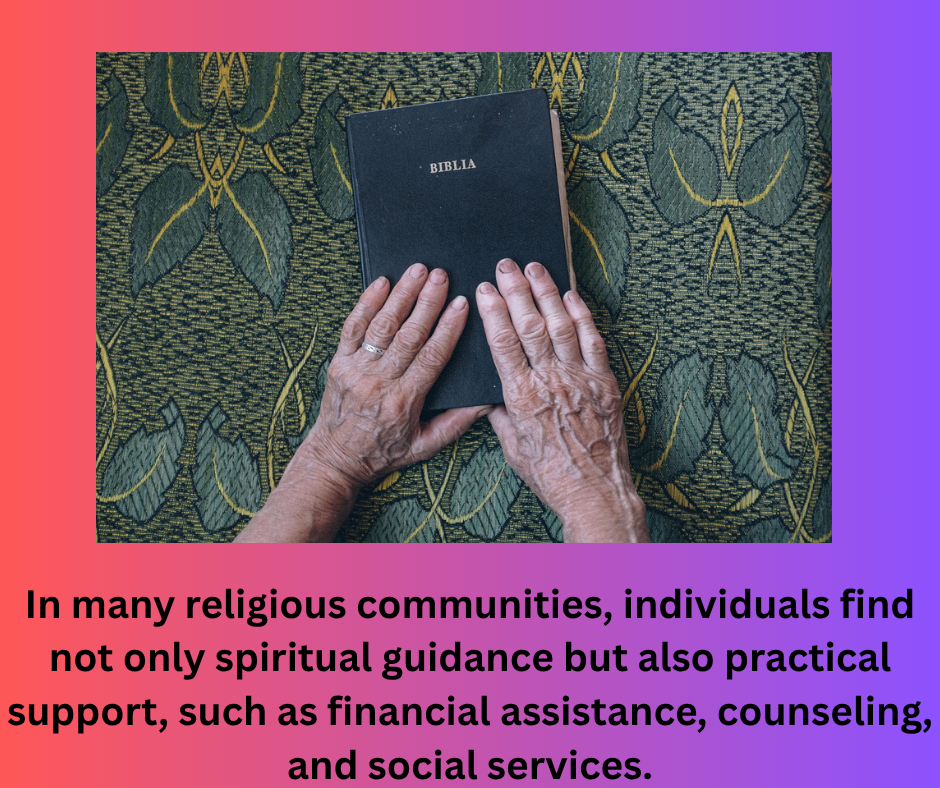We Need Religion,Religion has been a part of human existence for millennia, providing individuals and societies with frameworks for understanding the world, guiding moral behavior, and offering answers to life’s big questions. Yet, in the modern world, where science, technology, and secular ideologies increasingly shape our lives, many people wonder: do we still need religion?

As secularism grows, especially in the West, and many people are turning to non-religious ideologies, the role of religion in society is being questioned more than ever before. In this article, we will explore both the reasons why some argue that we no longer need religion and why others believe it is still essential for individuals and society.
Table of Contents
The Role of Religion in History
Religion has been an element of human culture from prehistoric times. From the earliest animistic beliefs to the major world religions like Christianity, Islam, Hinduism, Buddhism, and Judaism, religion has shaped cultures, provided moral codes, and structured communities. We Need Religion,In early human societies, religion helped to explain the mysteries of the world, such as the origins of life, the reasons for natural phenomena, and what happens after death. It also provided a sense of unity and identity, as shared religious practices and beliefs often bound people together.
In addition to offering spiritual guidance, religion played a significant role in governance, law, and education in many societies. Hammurabi’s code, for example, was one of the first recorded laws and was based on divine will. In medieval Europe, the Catholic Church wielded tremendous power over not just religious but also political matters. Religious institutions were responsible for preserving knowledge and advancing education, with monasteries and religious scholars preserving texts during the Dark Ages.
Religion also inspired some of history’s most significant social movements, such as the abolition of slavery, the civil rights movement in the United States, and the fight for women’s rights. The moral and ethical teachings of many religious traditions have often been a driving force for individuals to stand up for justice, human dignity, and equality.
Arguments for Why We No Longer Need Religion
Scientific Advancements and the Rise of Secularism
One of the primary reasons that many argue we no longer need religion is the progress of scientific understanding. Throughout history, religious explanations of the natural world were the most widely accepted, but with the rise of science, many of these explanations have been replaced by empirical evidence. For instance, the theory of evolution has largely replaced religious creation stories, and the understanding of diseases and medicine has eliminated the need for religious explanations of health and illness.
In a world where scientific discoveries continue to answer fundamental questions about the universe, some people feel that religion no longer provides answers to questions about the natural world. We Need Religion,Additionally, secular philosophies and humanist ideologies, which emphasize reason, ethics, and personal freedom without reliance on religious beliefs, have gained prominence. These secular systems can offer guidance on how to live a meaningful and ethical life without the need for a belief in the supernatural or divine commandments.
Moral Progress without Religion
Another argument against the necessity of religion is the claim that moral and ethical progress can be achieved without religious frameworks. Many of the advances in human rights, equality, and social justice in modern times have occurred in largely secular societies. Laws prohibiting slavery, granting women the right to vote, and recognizing the rights of LGBTQ+ individuals have been passed in many countries with minimal or no input from religious authorities.
Secular humanism, which emphasizes human reason, empathy, and the well-being of all people, has become a strong moral framework for many people around the world. Philosophers like Immanuel Kant, John Stuart Mill, and Peter Singer have contributed to a secular ethical system based on rationality and compassion rather than religious dogma.

Furthermore, many religious teachings have been criticized for fostering inequality and intolerance. For instance, historical interpretations of Christianity, Islam, and Judaism have been used to justify the oppression of women, slavery, and discrimination against LGBTQ+ people. Some argue that religious belief systems can be rigid and resistant to change, while secular philosophies are more adaptable to modern values of equality and human rights.
Religion and Conflict
One of the strongest criticisms of religion is its role in conflict and division. Throughout history, religion has been a source of violence, war, and persecution. We Need Religion,The Crusades, the Thirty Years’ War, the Inquisition, and the rise of religious extremism in the modern era are all examples of how religion has been used as a tool for political power and violence. Even in modern times, conflicts like those in the Middle East or the rise of Islamic extremism in the form of ISIS have shown the dangers of religious ideologies being manipulated for violent purposes.
Secular societies, some argue, are more peaceful because they are not divided by religious differences. In countries where secularism has been adopted, there tends to be less religious violence and more tolerance for people of different beliefs. For instance, Scandinavian countries, which are known for their high levels of secularism, also rank highly in terms of social welfare, education, and overall happiness.
The Decline of Religious Belief
The declining influence of religion in many parts of the world, particularly in the West, provides evidence for those who argue that we may no longer need religion. According to Pew Research, the number of people identifying as religiously unaffiliated (often referred to as “nones”) is growing rapidly, especially among younger generations. In many countries, people are increasingly identifying as atheist, agnostic, or secular, signaling a shift away from traditional religious institutions and practices.
As societies become more connected and access to information increases, people are questioning long-held beliefs and turning to other sources of meaning and purpose. We Need Religion,The rise of individualism and personal freedom has also led many to seek their own understanding of life, morality, and purpose, often outside the bounds of organized religion.
Arguments for Why We Still Need Religion
Religion Provides Meaning and Purpose
One of the most compelling reasons people still turn to religion is the sense of meaning and purpose it provides. While science can explain how the universe works, it cannot answer the existential questions that many people grapple with: Why are we here? What happens after death? What is the meaning of life? Religion offers frameworks for individuals to find meaning in their lives, providing a sense of belonging and connection to something greater than themselves.
Religious rituals, practices, and communities offer people comfort in times of hardship, loss, or suffering. For those experiencing grief, illness, or personal challenges, religion can provide solace and a sense of hope. It can also provide a moral compass, helping individuals navigate the complexities of life and make decisions that align with their values.
Religion Fosters Community and Social Support
Religion has an important role in establishing community and providing social support. Religious institutions, from churches to mosques, temples, and synagogues, provide spaces for people to come together, share experiences, and support one another. In many religious communities, individuals find not only spiritual guidance but also practical support, such as financial assistance, counseling, and social services.
The value of community and belonging is essential to human well-being. Religion creates bonds between people, fostering social cohesion and cooperation. In societies where religion is central to the culture, it often serves as a unifying force, helping to maintain social order and promote a sense of collective identity.
Religion and Ethical Frameworks
While some argue that morality can exist without religion, many people find that religious teachings provide a clear and enduring ethical framework. The moral teachings of religions such as Christianity, Islam, Judaism, Buddhism, and Hinduism emphasize compassion, forgiveness, generosity, and respect for others. These teachings guide individuals in their interactions with others and provide a standard for right and wrong.
Religious traditions often emphasize the importance of empathy and altruism, encouraging individuals to care for the poor, the sick, and the marginalized. Many of the world’s largest charitable organizations are religious in origin, such as Catholic Charities or Islamic Relief. We Need Religion,These organizations provide critical support to millions of people in need, demonstrating how religion can be a force for good in the world.
Spiritual Fulfillment
Religion provides a path to spiritual fulfillment that goes beyond materialism. In a secular society, where consumerism and individualism are often emphasized, religion offers a sense of connection to the divine, the sacred, and the transcendent. For many, spirituality is a source of inner peace, joy, and purpose that cannot be fulfilled through material wealth or success alone.
Conclusion:
The question of whether we need religion is ultimately a personal and subjective one. While some people find meaning, purpose, and community in religion, others find fulfillment in secular ideologies, philosophy, or individualism. We Need Religion,It is clear, however, that religion continues to play a significant role in the lives of billions of people around the world, providing moral guidance, spiritual fulfillment, and a sense of belonging. While we live in an increasingly secular world, the need for religion—whether in its traditional or modern forms—remains a powerful force in shaping human lives and societies.